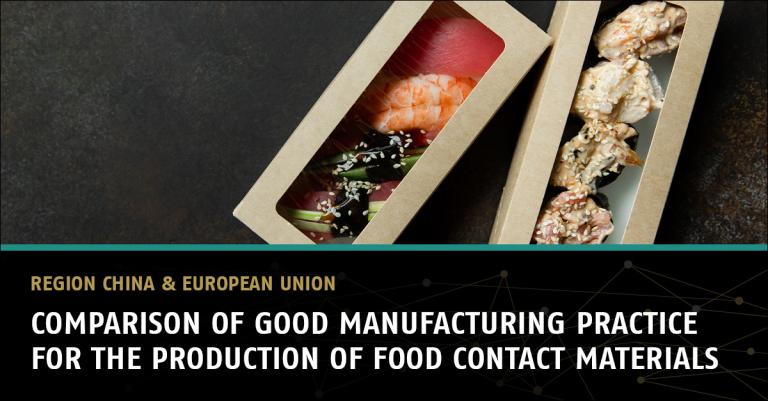Comparison of Good Manufacturing Practice (GMP) for the Production of Food Contact Materials between China and EU
State Administration of Market Regulation (SAMR) Order [2022] No. 60 1
On 1 March 2023, China officially implemented the Interim Measures for the Supervision and Administration of the Quality and Safety of Food-related Products (State Administration of Market (SAMR) Regulation Order [2022] No. 60, abbreviated as Order No. 60.
Order No. 60 is based on China’s Food Safety Law, Product Quality Law and other relevant laws and regulations. The manufacture and sale of all food-related products in China, as well as their production and management, are governed by Order No. 60. Food-related products are defined as food packaging materials, containers, detergents, and disinfectants used for food as well as tools and equipment used in the production and operation of food.
Order No. 60 stipulates that:
- Companies, producers, and sellers are required to establish and comply with an effective safety control system to ensure that raw and auxiliary materials, as well as semi-finished and finished products comply with the corresponding food safety requirements.
- For regulators, it regulates daily supervision and inspection of regulatory work to strictly guard food safety.
GB 31603-20152 is China’s Good Manufacture Practice (GMP) standard for the production of food contact material and articles. While both GB 31603 and Order No. 60 impose requirements on food contact manufacturing process, they have different governing authorities. GB 31603 was developed by Nation health commission (NHC) in China and order No. 60 was developed by SAMR. Food contact manufacturers are expected to comply with both of these requirements.
Comparison of GB 31603, Order No. 60 and Reg (EC) No 2023/20063 (EU’s GMP)
EU’s Reg (EC) No 2023/2006 establishes GMP requirements for food contact materials and articles for the EU market. A review of this regulation against GB 31603 and Order No. 60 is insightful to demonstrate how companies familiar with EU GMPs can comply with the new Chinese order. All of these three standards/orders stipulate that raw materials, final food contact products and food contact production processes should not pose a risk to human health or lead to changes in food characteristics.
Scope
As defined above, Order No. 60 includes requirements for food-related products producers, sellers, and regulators. GB 31603 specifies the manufacturing of food contacts materials (FCM) and articles. This includes the entire supply chain from raw materials, auxiliary materials procurement, processing, packaging, storage, and transport. In addition, this standard also covers manufacturing premises, facilities, personnel and basic requirements and management guidelines. It is applicable to the production of all kinds of FCM and articles and is basis of hygienic norms for specific FCM.
Reg (EC) No 2023/2006 applies to all sectors and to all stages of manufacture, processing, and distribution of FCM and articles excluding the production of starting substances such as monomers and catalysts used in the manufacture of polymers.
Personnel
Order No. 60 requires that an FCM manufacturing company should establish a structure of quality and safety management personnel, with quality and safety directors, quality and safety officers and personnel in charge of the company according to the characteristics of the company.
GB 31603 stipulates that a company should have a person in charge of food safety related work, and that the person in charge of the company, production operators and inspectors should be familiar with their food safety job responsibilities. A training system should be set up the train relevant personnel in food safety.
Reg (EC) No 2023/2006 mentions in Article 5 that the business operators shall establish, implement, and ensure adherence to an effective and documented quality assurance system, and the system shall take into account the adaptability of personnel and their knowledge and skills required for the finished materials and products to comply with its applicable regulations.
Raw materials
Ensuring the safety of raw materials is essential for the entire production line.
Order No. 60 states that only raw and auxiliary materials and additives that comply with China’s food contact standards and related announcements and that do not exceed any mandated scope or limit can be used in FCM and articles. Producers should implement raw material control, which should include the process of procurement, acceptance, storage, and use of raw materials, and keep records of the relevant processes. Safety assessments and verification should be conducted for the first use of new raw materials and auxiliary materials, formulations, and production processes. Records are to be kept of this verification process.
On this point, GB 31603 and Order No. 60 requirements are consistent, as both control raw and auxiliary materials. In addition to verification process noted in Order No. 60, GB 31603 requires that raw materials, formulations, and production processes be evaluated and qualified before mass production and re-assessed after any process change.
Reg (EC) No 2023/2006 requires that starting materials shall be selected and comply with pre-established specifications that shall ensure compliance of the material or article with applicable rules.
Manufacturing process requirements
Order No. 60 states that manufacturers should establish a quality and safety management system to ensure that the entire process of FCM products meets standards and requirements. This includes production, storage, packaging and other key links in the production control, process, factory and other inspection control, transport, and delivery control. For inspection control, Order No. 60 proposes that companies should set up a factory inspection record system and non-conforming products management system. A company may either inspect products themselves or may entrust a qualified third-party inspection organization. This is consistent with the requirements of GB 31603.
As product traceability is key, Order No. 60 and GB 31603 both stipulate that the product traceability system should be set up, and a recall system should be established. Reg (EC) No 2023/2006 mentions the business operator shall establish and maintain an effective quality control system.
Documentation
All three of these standards require the establishment and maintenance of documentation relating to the conformity of finished materials and products to safety specifications and the control of relevant operational records according to the type of manufacturing operation.
Order No. 60 and GB 31603 require that the retention period for each record should not be less than the shelf life of the respective product, or at a minimum, 2 years.
Labelling
Order No. 60 provides requirements for the labelling of a food contact producer's name, address, contact information, etc., and requires clarity, truthfulness, and accuracy in order to not deceive or mislead consumers. This provision is to help consumers make choices according to the producer's situation, to facilitate consumer contact in case of problem, and the implementation of effective supervision by a regulator. For example: shelf life can indicate the safety of food-related products; the material and product standard code are additional requirements related to product safety; the precautions and warning information can help consumers to grasp the characteristics of the products and protect consumer safety.
GB 31603 mentions that labelling should meet requirements of relevant regulatory requirements. Labeling is not covered in Reg (EC) No 2023/2006; however, requirements for the labeling for food contact articles are covered in EU’s framework Regulation (EC) 1935/20044.
Printing requirement
While printing inks are not mentioned in Order No. 60, both GB 31603 and Reg (EC) No 2023/2006 stipulate that non-contact surfaces should not come into direct contact with food, and ink should not be transferred to food.
If you have questions about GMP, or wish to learn more about FCM in China, EU or globally, please contact the knoell FFCM team here.
1 Interim Measures for the Supervision and Administration of the Quality and Safety of Food-related Products (State Administration of Market Regulation (SAMR) Order [2022] No. 60) https://www.gov.cn/gongbao/content/2022/content_5729425.htm?eqid=8f24a6720000b9e200000006645b0386
2 GB 31603-2015 National Food Safety Standard - General Health Code for Production of Food-contacted Materials and Products
3 COMMISSION REGULATION (EC) No 2023/2006 on good manufacturing practice for materials and articles intended to come into contact with food
https://eur-lex.europa.eu/legal-content/EN/TXT/?uri=CELEX%3A32006R2023&qid=1689327362483
4 Regulation (EC) No 1935/2004 of the European Parliament and of the Council of 27 October 2004 on materials and articles intended to come into contact with food https://eur-lex.europa.eu/legal-content/EN/ALL/?uri=CELEX:02004R1935-20090807


